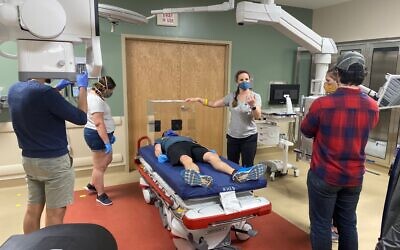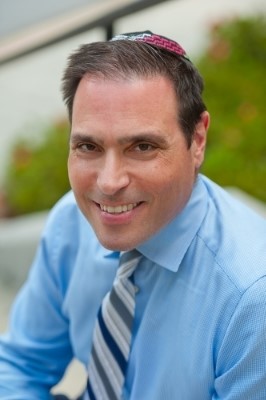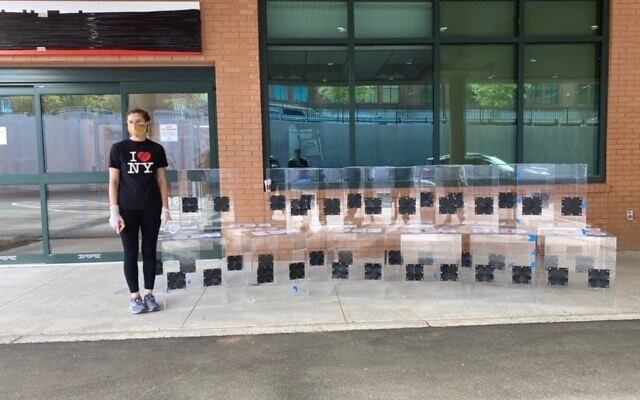Weber School Makes Medical Protection
Daniel Zalik Academy leaders build intubation boxes to protect medical staff from COVID-19.
Last week, students, parents and leaders of The Daniel Zalik Academy of Science, Technology, Engineering and Design at The Weber School mobilized to help the medical community on the front lines of the COVID-19 health crisis. Five leaders of the DZA developed and assembled acrylic intubation boxes that can protect medical staff when treating patients with COVID-19 respiratory infections.
The box fits over the patient’s head and shoulders as a protective shield between patient and doctors performing intubation, inserting a tube into the patient’s windpipe to maintain an open airway or to administer medicine.
About 20 of the clear boxes were delivered Thursday, April 9, to WellStar Health System and distributed the next day to 10 hospitals in the WellStar network.
Weber teacher and fabrication lab manager Madi Anderson, a Georgia Tech graduate with a degree in industrial design, led the effort in collaboration with a few Weber students and their parents.
“My mom is a healthcare worker [lab tech] and I just keep thinking there must be something we can build with our state-of-the-art equipment,” Anderson said. “What helpful way could we give our time and skills? We had this amazing lab space, amazing machines. We had laser cutters and 3D printers. I knew we had the ability,” she said.
“After discussions with ER doctors and other healthcare officials, the intubation boxes are where there is an urgent, critical need. So we got to designing and fabricating in our lab.”

The Weber School community rallied around this initiative and “with its web of networking put us in touch with doctors at WellStar as well as executives at The Home Depot for supplies,” Anderson said. “Home Depot connected us with a vendor for the acrylic sheets so we could begin fabricating the intubation boxes.”
With the increase in COVID-19 infections in the U.S., there’s a growing need for medical professionals to intubate, which poses significant risk of spreading the virus, especially for specialists such as pulmonologists and ear-nose-and-throat doctors, said Dr. Brett Cannon. He manages several emergency room departments at WellStar and received the boxes from Weber last week.
Typically, an intubation bag is used for ventilation. But those bag supplies are running low and they are only good for one use. The intubation box can be cleaned with a bleach or alcohol solution after each use and reused.
“Healthcare workers are at an increase risk of getting occupational exposure because of a number of sick people they are around,” Cannon said. Of the Weber donation, he added, “Certainly we appreciate their effort and their gifts.” He said he’s been impressed with the outpouring of community support. “A lot of people have stepped up with lots of ideas to solve problems. We are excited about anyone using their available tools to find solutions.”

The intubation boxes were based on a design developed by a doctor in Taiwan in January. The DZA staff modified the design to fit the American body type, based on conversations with Atlanta doctors, including Cannon, adding larger arm holes with stronger rubber seals around those holes.
In addition to the intubation boxes, the staff at the DZA also made the frames for face shields for healthcare workers. The DZA made 50 frames, which were delivered to the nonprofit Atlanta Face Shields for assembly and delivery.
Helping the community and saving lives are among the highest missions of the DZA and Weber, said head of school Rabbi Ed Harwitz.
“When we first envisioned the Daniel Zalik Academy, its mission was centered around students and faculty working together to improve the lives of people in need, to serve the world and the community. We never envisioned the team, students, faculty and parents would be called to provide this service at a time such as this,” meeting a critical need as a part of such lifesaving measures, Harwitz said.
He added that he was proud that Weber’s high-level intellectual capital as well as its tools and instruments could be brought to bear to support medical professional at such an important time.
Highly skilled students have been able to collaborate with faculty on design discussions on the devices, he said. And among the larger Weber community, Harwitz said, “The response has been: how can we help?” Members of the community helped contribute to the cost of the supplies and parents offered relationships, including The Home Depot, which allowed significant discounts for the supplies to produce the boxes.
“The need and crisis created an opportunity to motivate a higher level of response and service,” Harwitz said.
The five leaders of the Daniel Zalik Academy designed and produced the device working individually in the DZA lab on a rotating basis as “essential personnel,” necessary to aid in the health crisis, he explained.
He said the devices help medical professionals protect themselves and take the best care of patients so they can save lives. “There’s no greater principal in Jewish law and culture that guides life and the world. It is the highest ideal in Judaism, pikuash nefesh, saving a life. In addition, it’s the mission of any great Jewish school and the Daniel Zalik Academy to have a positive and meaningful impact on world. There are additional obligations to act and to serve.
Anderson said the DZA team hopes to build more of the devices for other Atlanta and North Georgia hospitals that need them.
The first step was to design an assembly line for the product. “We had to figure out how to produce them in the quickest time possible” to meet the urgent and immediate need, she said. In the future, the pieces could be cut in the lab by the professional team and dropped at a student’s door for assembly.
“We are trying to expand. We have a lot of material and we have another shipment coming so we want to make as many as possible.”
The Daniel Zalik Academy is a state-of-the-art science, technology, engineering, and design institute made possible by a generous grant by the Zalik Foundation Fund.
David Zalik, brother of the academy’s namesake, said of the recent effort, “We are so proud of the students and teachers at The Weber School who are using their science lab to create much needed medical equipment in near real time for our caregivers on the front lines when they need it most!”




comments